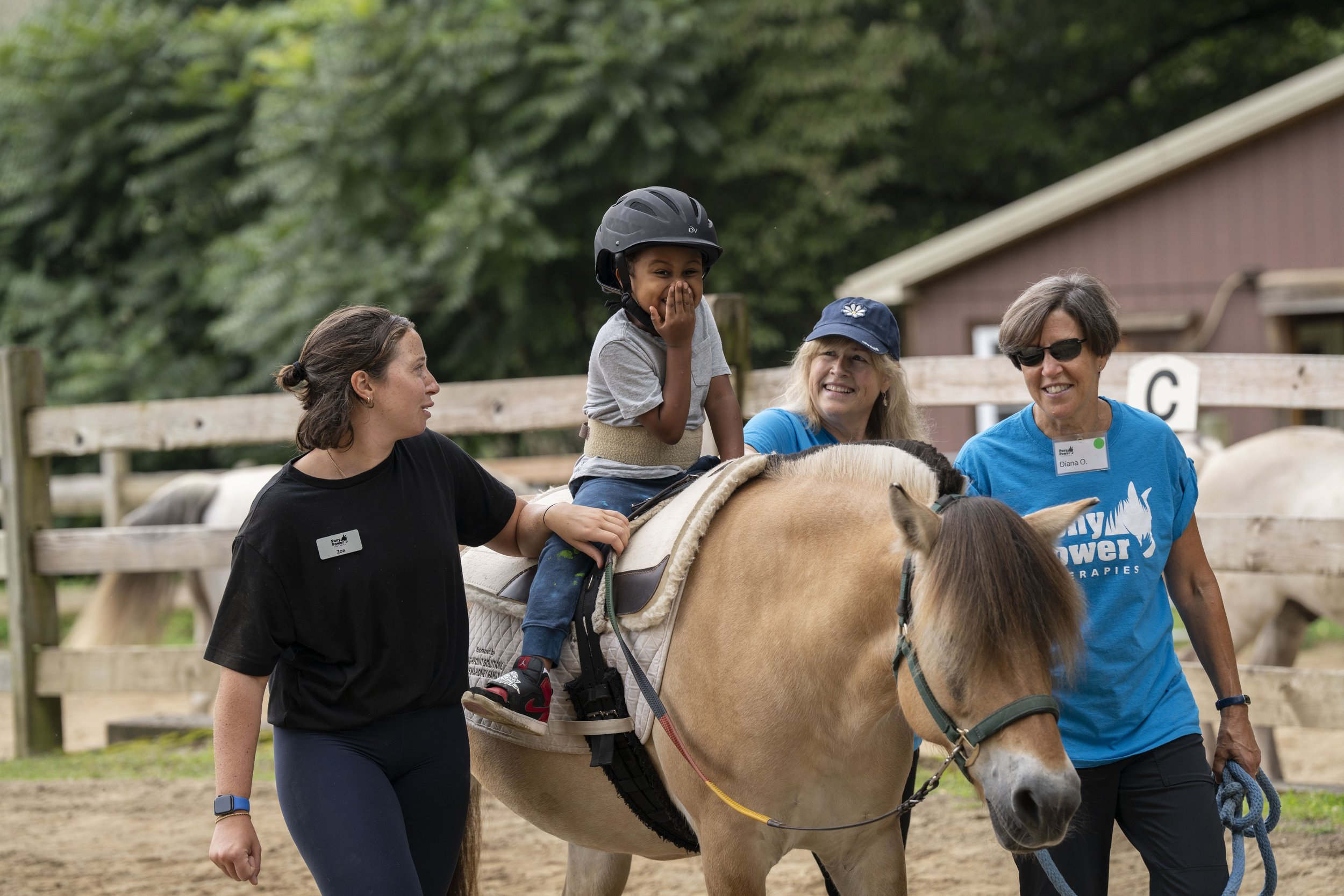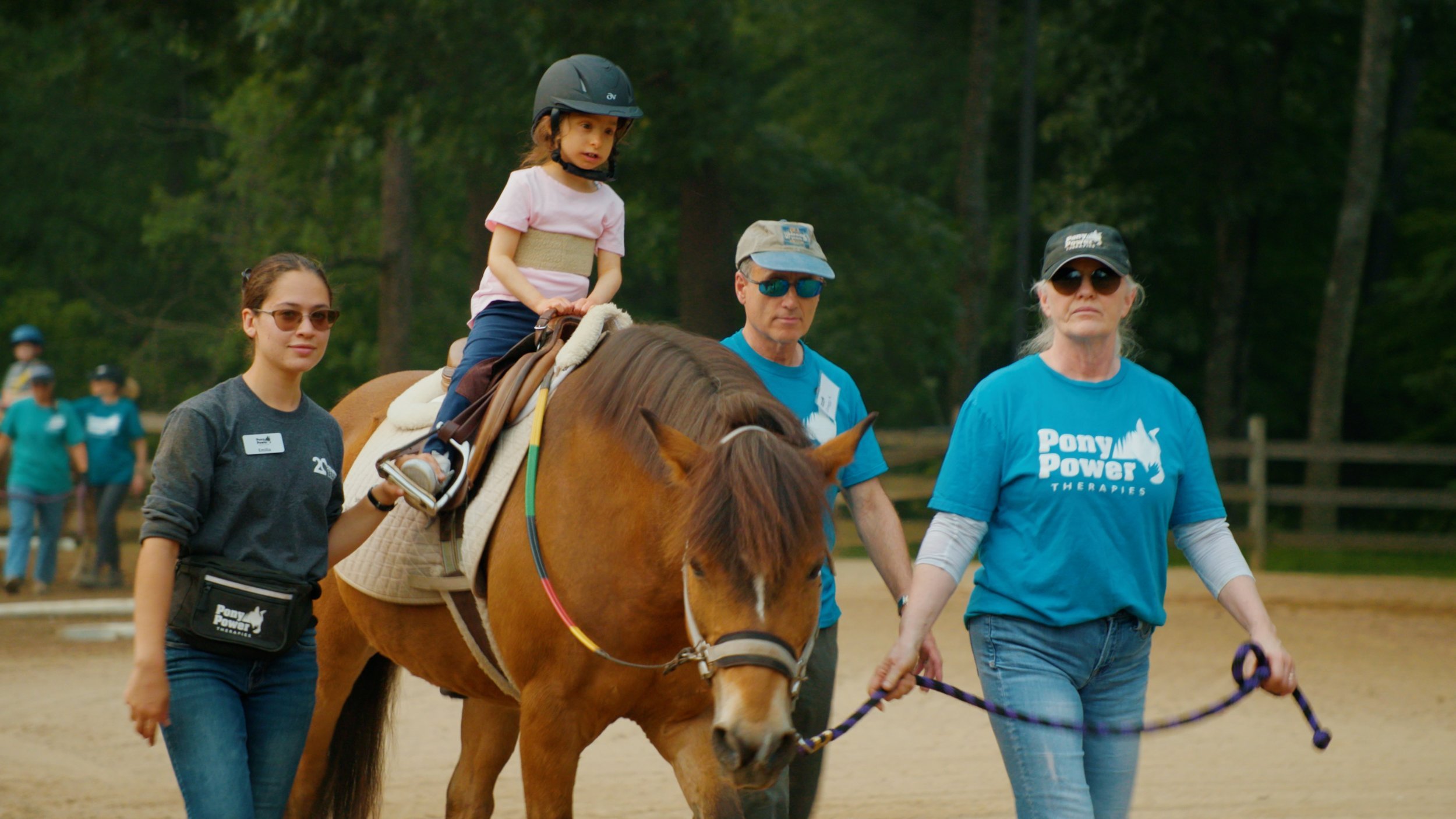
Therapeutic
Horseback Riding
Therapeutic horseback riding allows participants to learn basic horseback riding skills in a safe, structured and supportive environment. During each 30-minute riding lesson, participants are paired with an instructor, two trained volunteers, and a horse to suit their individual needs.
Therapeutic horseback riding is a recreational activity that can contribute to a participant's physical, social and emotional well-being. Pony Power prioritizes rider safety and each person’s unique learning style and pace by offering one-on-one instruction. We pair each rider with a horse or pony suitable for their size and needs. All of our horses have been selected for this work based on their temperament, size and quality of movement.
Age: 2.5 years through adulthood
Lesson duration: 30 minutes
Semesters offered: Summer (July-Aug), Fall (Sept-Dec), Winter (Jan-Feb) and Spring (Mar-June)
Potential benefits: Life skills such as self-regulation, and riding skills that may include use of reins and other aids while maintaining a centered position on the horse. Participants also experience emotional benefits from riding, such as feelings of self-confidence, independence and accomplishment.
Fees:
Summer & Winter Semesters: $510 for 6 lessons Siblings: $390 for 6 lessons
Fall & Spring Semesters: $1020 for 12 lessons Siblings: $780 for 12 lessons
Additional form required: Physician Statement Form
-
Riders must:
be cleared medically to participate and considered safe and appropriate for the activity by Pony Power staff
provide a completed Physician Statement form
meet height and weight guidelines established for our current herd of horses according to industry standards
be able to tolerate wearing a riding helmet for the entire lesson
provide their own ASTMI-approved helmet
please also note that parents/guardians/caregivers must stay on site during all individual lessons, and that equipment may vary as determined by Pony Power staff.

“I'm constantly raving about Pony Power: how amazing it is, how beneficial it is...There are amazing people who work here. It feels like family.”
— Renata, participant parent
Summer 2025 Schedule
Spring Breaks: Apr 13-20, May 25-29
Summer Registration Opens for afternoon individual lessons: April 25
Spring Semester Ends: Jun 12
Summer Semester Starts: July 7
Summer Breaks: July 28-31

A horse's movement is rhythmic, repetitive, responsive and mirrors the human gait.
By maintaining an upright position on a horse's back, riders strengthen and develop muscles in their trunk, neck and legs. Riders are also provided proprioceptive, vestibular and sensory input, helping them to coordinate movements, integrate both sides of their body simultaneously and gain a greater sense of body awareness.
FAQ
-
No, our programming is open to those who need more support or different programming options than traditional equestrian centers offer. There is no requirement for proof of a medical diagnosis or a doctor’s prescription.
-
No. Since we are not a medical facility, we are unable to accept insurance, Medicaid or Medicare.
-
No, our programming is open to those who need more support or different programming options than traditional equestrian centers offer.
-
The minimum participant age for riding is 2.5 years old. There is no maximum age as long as our staff deem the activity safe and appropriate for an individual and a doctor has cleared the individual medically. Our Forest Babies program is open to children as young as 18 months old.
Volunteers must be at least 14 years old. There is no maximum age for volunteers. All volunteers must be able to walk for at least 90 minutes and jog for short stints during each lesson.
-
During the school year, lessons are given on Sunday mornings and Monday through Thursday, 3-6 pm. In summer, lessons are given Monday through Thursday, 3-6pm.
-
Individual lessons are 30 minutes. School groups are usually one hour, but duration for other types of groups may vary depending on the objective and the number of participants.
-
We book by semester and do not offer single lessons because we find some participants may need time to adjust to the environment and become familiar with our routine.
-
Hippotherapy focuses on achieving specific, clinical goals in the areas of occupational, physical or speech therapy. Therapeutic riding is a recreational activity that focuses on teaching each individual to ride a horse within his or her ability. Many riders experience therapeutic benefits such as increased focus, greater flexibility and balance and better fine and gross motor planning. To learn more about the benefits of therapeutic riding, click here.
-
All participants (riding and non-riding), must wear sturdy, closed-toe shoes and long pants, as well as dress accordingly for outdoor weather conditions. All riders must wear a properly fitted ASTM-SEI-approved helmet and closed-toe shoes. While we use safety stirrups, we require riders working toward independence to wear a boot with a heel, instead of a sneaker.
-
We are committed to providing this unique recreational activity to as many people as possible. Our costs continue to increase annually, but we have maintained client fees at the same level for more than a decade in order to provide affordable access to our service. Session fees currently cover only a portion of the actual cost to run lessons; we rely on the generosity of our donors to help underwrite the remaining amount each year. Our hope is that we can continue facilitating all of our participants’ personal growth with subsidized tuition for years to come.
-
Once new participants are enrolled and scheduled, we invite families to come for a tour to become familiar with the location, parking and facilities before a semester begins.
